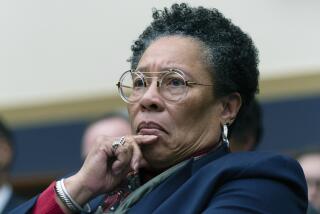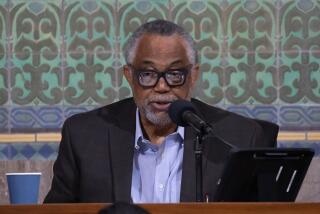Former HUD Aide Refuses to Answer Questions
- Share via
WASHINGTON — A former aide to ex-Housing Secretary Samuel R. Pierce Jr. followed Pierce’s example Wednesday and refused to answer House investigators’ questions, invoking the Fifth Amendment right to avoid self-incrimination.
Lance Wilson, who is accused of profiting handsomely from his government service, appeared under subpoena a day after Pierce had exercised his constitutional right to remain silent about his eight-year tenure at the Department of Housing and Urban Development.
Like his old boss, Wilson accused the House Government Operations subcommittee that is investigating political favoritism and influence peddling at the department of prejudging him. But members of the panel dismissed his claims as self-serving and irrelevant.
Rep. Tom Lantos (D-San Mateo), the subcommittee chairman, said that Wilson has made millions of dollars from HUD-related projects since he left the agency and has received consulting fees to use his influence with HUD officials, whom he entertained lavishly on his expense account.
Wilson, now a $325,000-a-year executive with a Wall Street investment firm, refused to explain what he did to earn a $10,000 check that he received from retired HUD official Alexander Naclario in May, 1988, when he apparently was moonlighting from his full-time job with PaineWebber Group Inc.
Naclario, taking the stand after Wilson was excused, said that he paid Wilson the money to end the opposition of Hunter Cushing, former deputy assistant secretary of housing, to an application for FHA mortgage insurance on a big New York City apartment project.
Another HUD official, Naclario testified, told him that Cushing had asked why he should help Naclario.
Naclario said that he then called Wilson and offered him $10,000 to persuade Cushing to drop his opposition. Wilson reported shortly afterward that Cushing had denied making any such remark and would not oppose the application if the HUD technical staff approved it, Naclario said.
Cushing, now an official with the Commerce Department, previously invoked the Fifth Amendment to avoid self-incrimination when he was called to testify before the congressional panel.
Earlier, Naclario said, he was summoned to Washington in 1982 by Wilson to help get HUD approval for a project in Puerto Rico that was backed by a major political contributor to George Bush, then vice president.
He traveled to the island and met the contributor, Delio Rojo, Naclario said, and found that the proposed housing project for the elderly was to be located in a building that included a gambling casino, restaurants and swimming pools.
To meet HUD requirements for subsidized housing, he said, he recommended that the casino, pools and restaurants be regarded as “off-site” properties that would pay rent to the project to reduce the amount of rents paid by low-income persons.
In another case, he said, he paid Wilson $5,000 for helping another unidentified Puerto Rican developer with a HUD grant application.
In his opening remarks, Lantos said that Wilson played a key role in pushing an application by Leonard Briscoe, a Ft. Worth, Tex., developer, for a $7-million HUD urban development grant.
“The . . . project was awarded funds over the strong objection of the HUD regional office career staff, who viewed the project as ill-conceived, ill-designed and undercapitalized,” Lantos said. Wilson refused to answer a question about the Briscoe grant.
After leaving HUD, Lantos said, Wilson received a 15% interest from Briscoe in another development in Florida worth about $3.5 million.
Since he began work at PaineWebber in 1986, the subcommittee chairman said, Wilson has spent more than $10,000 on lunches, dinners and receptions for HUD employees, including a $1,000 dinner for his hand-picked successor at HUD, Deborah Gore Dean. Earlier, Dean also invoked the Fifth Amendment.
More to Read
Get the L.A. Times Politics newsletter
Deeply reported insights into legislation, politics and policy from Sacramento, Washington and beyond. In your inbox three times per week.
You may occasionally receive promotional content from the Los Angeles Times.










